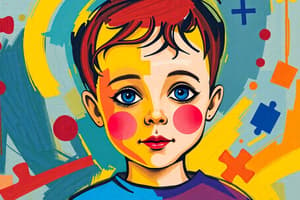Podcast
Questions and Answers
What is the main characteristic of a child with a learning disability?
What is the main characteristic of a child with a learning disability?
- A discrepancy between achievement and intelligence (correct)
- A physical disability
- A lack of intelligence
- A behavioural disorder
What percentage of people with learning disabilities are right brain dominant?
What percentage of people with learning disabilities are right brain dominant?
- 70% (correct)
- 80%
- 60%
- 50%
What is dyslexia characterised by?
What is dyslexia characterised by?
- A behavioural disorder
- A lack of intelligence
- A mix of complex reading, writing and learning troubles (correct)
- A physical disability
Why do children with dyslexia often struggle in school?
Why do children with dyslexia often struggle in school?
What is NOT a possible cause of dyslexia?
What is NOT a possible cause of dyslexia?
What is the age when symptoms of dyslexia usually begin to show up?
What is the age when symptoms of dyslexia usually begin to show up?
What is the term used to describe the type of dyslexia related to processing sound?
What is the term used to describe the type of dyslexia related to processing sound?
What is the learning disorder that affects a person's ability to comprehend written or oral language?
What is the learning disorder that affects a person's ability to comprehend written or oral language?
What is the term used to describe the type of dyslexia related to processing visual information?
What is the term used to describe the type of dyslexia related to processing visual information?
What is the specific learning disability that affects a person's ability to perform arithmetic operations?
What is the specific learning disability that affects a person's ability to perform arithmetic operations?
Flashcards are hidden until you start studying
Study Notes
Learning Disability (LD)
- A disorder in one or more basic psychological processes involved in understanding or using language for speaking and writing.
- May manifest in disorders of listening, thinking, talking, reading, writing, spelling, or arithmetic.
- Characterized by a discrepancy between achievement and intelligence.
Types of LD
- Dyslexia: A mix of complex reading, writing, and learning troubles in which letters and numbers are reversed or seen upside down.
- 70% of LDs are right brain dominants.
- Dyscalculia: A specific learning disability in mathematics, particularly difficulty in performing arithmetic.
Dyslexia
- Causes: Hereditary, birth trauma, postnatal problem, prenatal problem, and if the mother is an alcoholic.
- Symptoms:
- Shapes or sequences of letters or numbers appear changed or reversed.
- Spelling is incorrect or inconsistent.
- Words or lines are skipped when reading or writing.
- Letters and numbers appear to move, disappear, grow, or shrink.
- Punctuation marks or capital letters are omitted, ignored, or not seen.
- Words and letters are omitted, altered, or substituted while reading or writing.
- Some speech sounds are difficult to make or mispronounced.
- False sounds are perceived.
- The person appears to not listen or hear what is said.
- Excessive daydreaming, and trouble being on time.
- Hyperactivity or hypoactivity can occur due to frustration.
- Deviations in language production:
- Addition
- Deletion
- Substitution
- Repetition
- Reversal
- Not caused by brain damage or stupidity; many dyslexics are far brighter than average.
- Often mistaken as a learning disability, but actually, it's a teaching disability, requiring specialized training for teachers.
Subtypes of Dyslexia
- Dysphonetic (Auditory Dyslexia): Difficulty connecting sounds to symbols, leading to regular spelling mistakes and difficulties in sounding out words.
- Dyseidetic (Surface Dyslexia or Visual Dyslexia): Difficulty with word recognition and spelling, related to visual information processing.
Studying That Suits You
Use AI to generate personalized quizzes and flashcards to suit your learning preferences.




